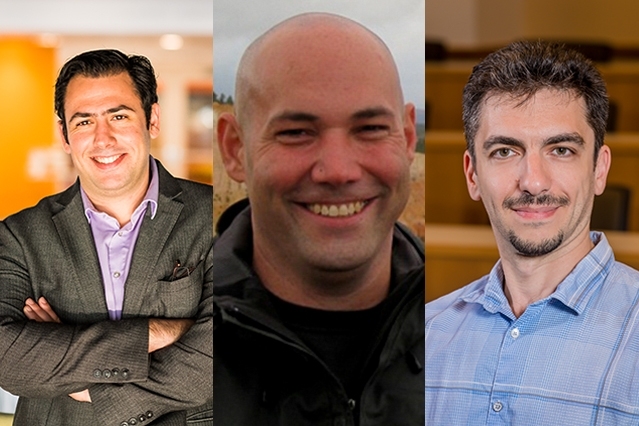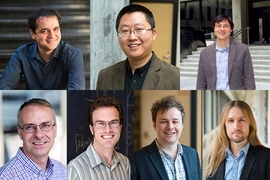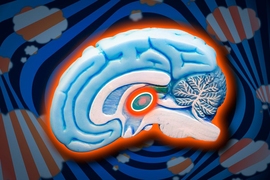This spring, the MIT School of Science welcomes three new professors in the departments of Brain and Cognitive Sciences, and Earth, Atmospheric and Planetary Sciences.
Michael Halassa aims to understand the neural basis of cognitive control and flexibility, particularly as it relates to attention and decision making. To study these questions, he has developed behavioral models of cognitive function in mice, allowing him to probe the underlying neural circuits and computations using parametric behavior, electrophysiological recordings, and causal manipulations. His major current focus is understanding the function of the thalamus, traditionally considered a relay station for sending sensory information to the cortex. Halassa is also a board-certified psychiatrist with fellowship training in psychotic disorders. Motivated by this clinical training, Halassa studies how the brain generates hypotheses about the world and how these hypotheses may be corrupted by disease processes such as schizophrenia. By developing perceptual tasks in animals that capture the underlying basic cognitive operations, Halassa aims to understand how the healthy brain generates such hypotheses and why the diseased brain has difficulty changing or revising them.
Halassa received an MD at the University of Jordan in 2004 and a PhD in neuroscience from the University of Pennsylvania in 2009. Following simultaneous appointments as a postdoctoral fellow in the laboratory of Matthew Wilson at MIT and as a resident in psychiatry at Massachusetts General Hospital, he joined the New York University faculty in 2014. Halassa joins the Department of Brain and Cognitive Sciences as an assistant professor and the McGovern Institute for Brain Research as an associate investigator.
Brent Minchew is a geophysicist working to understand the interactions between climate, the cryosphere, and the solid Earth. He uses a combination of geodetic observations — primarily interferometric synthetic aperture radar — and physical models to study dynamical systems and their various responses to environmental forcing. The bulk of Minchew’s research focuses on the dynamics of extant glaciers, with an emphasis on the mechanics of glacier beds, ice-ocean interactions, and ice rheology. By modulating ice flow and directly influencing glacier erosion rates, these factors play critical roles in glacier and ice sheet evolution, the dynamic response of glaciers to climate change, and the impact of glaciers on landform evolution and the global carbon cycle over human to geological timescales.
Minchew received BS and MS degrees in aerospace engineering from the University of Texas at Austin in 2008 and 2010. After completing his PhD in geophysics from the Caltech in 2016, he worked as a National Science Foundation postdoc with the Ice Dynamics and Paleoclimate Team at the British Antarctic Survey in the United Kingdom. Minchew joins the Department of Earth, Atmospheric and Planetary Sciences as an assistant professor.
Alexander “Sasha” Rakhlin works at the intersection of statistics, machine learning, and optimization. A major thrust of his research is in developing theoretical and algorithmic tools for online prediction, a method of machine learning that processes information provided in a sequential fashion. Rakhlin has uncovered critical connections between online prediction, optimization, and probability; these insights led to a fundamental theoretical understanding of the field as well as new efficient and accurate prediction methods. His contributions also include advances in statistical inference in structured problems, as well as new tools for optimal model selection. In newer lines of inquiry, Rakhlin developed a detailed analysis of statistical complexity of neural networks, offering insight into recent advances in deep learning.
Rakhlin received a BA in computer science and a BA in mathematics from Cornell University in 2000 and a PhD from MIT in 2006 under the direction of Tomaso Poggio. Following an appointment as a postdoc at the University of California at Berkeley, Rakhlin joined the faculty as an assistant professor at the University of Pennsylvania in 2009 with an appointment in the Department of Statistics at the Wharton School, and was promoted to associate professor with tenure in 2015. After spending a year as a visiting professor in the MIT Statistics and Data Science Center, Rakhlin joins the Department of Brain and Cognitive Sciences as an associate professor with tenure as well as the Institute for Data, Systems, and Society as a core faculty member.









